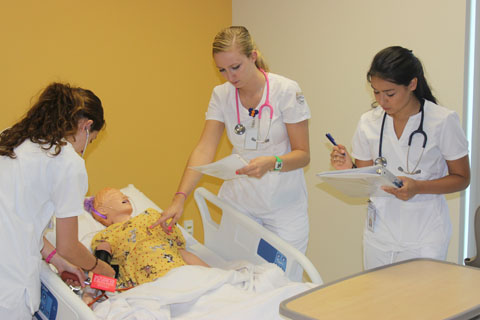
 |
| Oakland University's state-of-the-art simulation labs give nursing students real-world clinical experience. The facilities were recently featured on WWJ. |
In the labs, students work on mannequins that are programmed to mimic the characteristics of real-life patients. The mannequins enable students to gain hands-on experience with various medical procedures, such as administering medications, monitoring vital signs, obtaining blood and urine specimens, inserting a breathing tube and using a defibrillator.
In addition, students engage in role-playing exercises that develop their communication skills and bedside manner. These exercises help students prepare for the challenges of dealing with patients and families in a clinical setting.
“For pediatric nursing in particular, simulation helps students learn how to deal with ill children and their parents at the bedside,” said Meghan Harris, associate professor of nursing. “These parents are typically anxious about their child’s condition and require repeated explanations and calm responses.”
While working in the labs, which are designed to look like actual hospital rooms, students are observed by faculty through a one-way mirror and given feedback on their performance.
“I look for safety and accuracy. The old adage ‘safety first’ is always applicable in health care,” Dr. Harris explained. “There is a great deal of discussion in nursing education about critical thinking and clinical decision making. In the simulation experiences, you can actually see students acting on critical thought and making sound clinical decisions.”
Faculty members are not the only ones attesting to the benefits of simulation. Juliana Carlini, a senior in OU’s Bachelor of Science in Nursing program, says that lab experiences are a valuable complement to classroom education.
“Just having that practice time to be able to communicate with the mannequin, be in that situation where you’re performing the skills and getting feedback from your instructor and from other students, Carlini said. “That’s really important.”